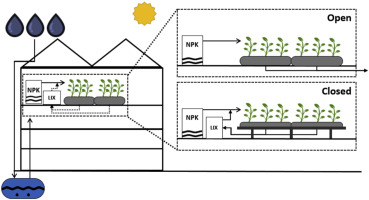Journal of Cleaner Production ( IF 9.7 ) Pub Date : 2020-03-23 , DOI: 10.1016/j.jclepro.2020.121213 Martí Rufí-Salís , Anna Petit-Boix , Gara Villalba , David Sanjuan-Delmás , Felipe Parada , Mireia Ercilla-Montserrat , Verónica Arcas-Pilz , Joan Muñoz-Liesa , Joan Rieradevall , Xavier Gabarrell

|
Urban agriculture systems, such as rooftop greenhouses, are attractive alternatives for mitigating the impacts of the extensive food supply chains that currently feed cities. In this study, we study the opportunity that nutrient recirculation offers to improve the environmental performance of agricultural systems. In particular, we analyze the environmental burdens of a hydroponic closed-loop production system that recovers nutrients and reduces water demand by recirculating the irrigation water leaching from the substrate bags along with nutrients that have not been assimilated by the plant. The closed-loop system is compared to a linear system in which there is no nutrient or water recovery. Based on two green bean crop cycles in a Mediterranean rooftop greenhouse, we analyze the yield, climatic variables and water and nutrient balances, and apply life cycle assessment (LCA) to study the environmental impacts.
The results of this study indicate that closed-loop systems save daily 40% of irrigation water and between 35 and 54% of nutrients. Moreover, leachate reuse leads to reduced eutrophication impacts, but it can entail nutrient deficiencies. However, implementing a closed-loop system requires additional infrastructure causing larger impacts than linear systems in terms of global warming and fossil resource scarcity. The results of the LCA were highly sensitive to the yield, the crop production period and the meteorological conditions. Based on these results, we design improved scenarios, providing recommendations for reducing the impacts of closed-loop systems for more sustainable cities.
中文翻译:

在城市农业中循环水和养分:实现环境可持续性和用水效率的机会吗?
诸如屋顶温室之类的城市农业系统是减轻当前为城市提供食物的广泛食品供应链的影响的有吸引力的替代方案。在这项研究中,我们研究了养分再循环提供的机会,以改善农业系统的环境绩效。尤其是,我们分析了水培闭环生产系统的环境负担,该系统可通过循环利用从基质袋浸出的灌溉水以及未被植物吸收的养分来回收养分并减少需水量。将闭环系统与没有营养或水回收的线性系统进行比较。基于地中海屋顶温室中的两个绿豆作物周期,我们分析了产量,气候变量以及水和养分平衡,
这项研究的结果表明,闭环系统每天可节省40%的灌溉水和35%至54%的养分。此外,渗滤液的再利用可减少富营养化的影响,但可能导致营养缺乏。然而,就全球变暖和化石资源稀缺而言,实施闭环系统需要额外的基础设施,与线性系统相比,其影响更大。LCA的结果对产量,作物生产时期和气象条件高度敏感。基于这些结果,我们设计了改进的方案,为减少闭环系统对更具可持续性的城市的影响提供了建议。









































 京公网安备 11010802027423号
京公网安备 11010802027423号